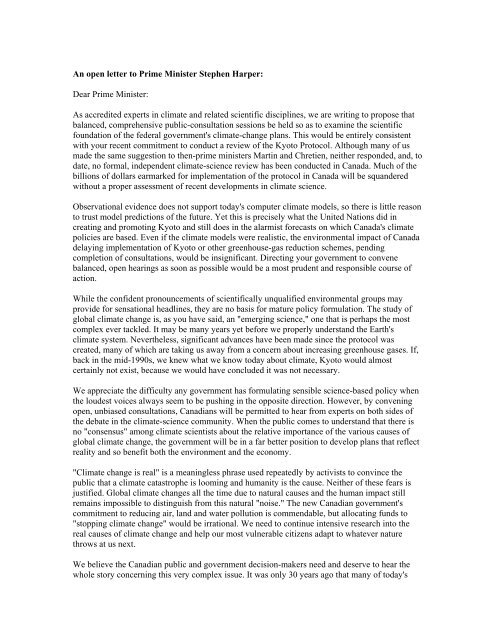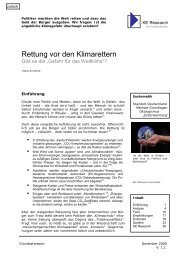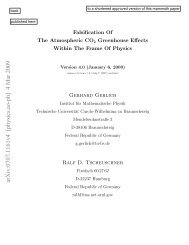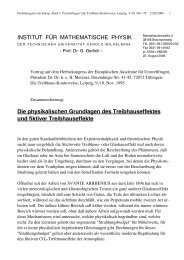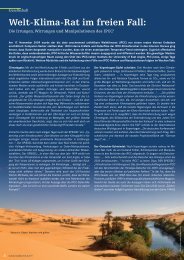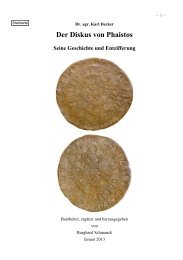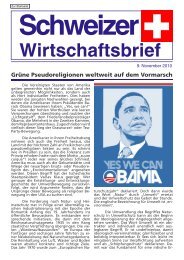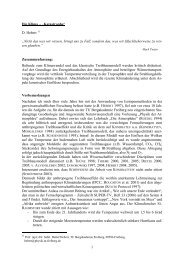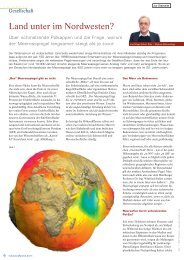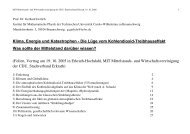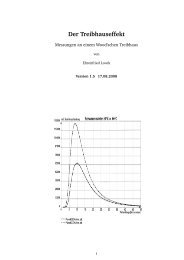An open letter to Prime Minister Stephen Harper: - CBC
An open letter to Prime Minister Stephen Harper: - CBC
An open letter to Prime Minister Stephen Harper: - CBC
You also want an ePaper? Increase the reach of your titles
YUMPU automatically turns print PDFs into web optimized ePapers that Google loves.
<strong>An</strong> <strong>open</strong> <strong>letter</strong> <strong>to</strong> <strong>Prime</strong> <strong>Minister</strong> <strong>Stephen</strong> <strong>Harper</strong>:<br />
Dear <strong>Prime</strong> <strong>Minister</strong>:<br />
As accredited experts in climate and related scientific disciplines, we are writing <strong>to</strong> propose that<br />
balanced, comprehensive public-consultation sessions be held so as <strong>to</strong> examine the scientific<br />
foundation of the federal government's climate-change plans. This would be entirely consistent<br />
with your recent commitment <strong>to</strong> conduct a review of the Kyo<strong>to</strong> Pro<strong>to</strong>col. Although many of us<br />
made the same suggestion <strong>to</strong> then-prime ministers Martin and Chretien, neither responded, and, <strong>to</strong><br />
date, no formal, independent climate-science review has been conducted in Canada. Much of the<br />
billions of dollars earmarked for implementation of the pro<strong>to</strong>col in Canada will be squandered<br />
without a proper assessment of recent developments in climate science.<br />
Observational evidence does not support <strong>to</strong>day's computer climate models, so there is little reason<br />
<strong>to</strong> trust model predictions of the future. Yet this is precisely what the United Nations did in<br />
creating and promoting Kyo<strong>to</strong> and still does in the alarmist forecasts on which Canada's climate<br />
policies are based. Even if the climate models were realistic, the environmental impact of Canada<br />
delaying implementation of Kyo<strong>to</strong> or other greenhouse-gas reduction schemes, pending<br />
completion of consultations, would be insignificant. Directing your government <strong>to</strong> convene<br />
balanced, <strong>open</strong> hearings as soon as possible would be a most prudent and responsible course of<br />
action.<br />
While the confident pronouncements of scientifically unqualified environmental groups may<br />
provide for sensational headlines, they are no basis for mature policy formulation. The study of<br />
global climate change is, as you have said, an "emerging science," one that is perhaps the most<br />
complex ever tackled. It may be many years yet before we properly understand the Earth's<br />
climate system. Nevertheless, significant advances have been made since the pro<strong>to</strong>col was<br />
created, many of which are taking us away from a concern about increasing greenhouse gases. If,<br />
back in the mid-1990s, we knew what we know <strong>to</strong>day about climate, Kyo<strong>to</strong> would almost<br />
certainly not exist, because we would have concluded it was not necessary.<br />
We appreciate the difficulty any government has formulating sensible science-based policy when<br />
the loudest voices always seem <strong>to</strong> be pushing in the opposite direction. However, by convening<br />
<strong>open</strong>, unbiased consultations, Canadians will be permitted <strong>to</strong> hear from experts on both sides of<br />
the debate in the climate-science community. When the public comes <strong>to</strong> understand that there is<br />
no "consensus" among climate scientists about the relative importance of the various causes of<br />
global climate change, the government will be in a far better position <strong>to</strong> develop plans that reflect<br />
reality and so benefit both the environment and the economy.<br />
"Climate change is real" is a meaningless phrase used repeatedly by activists <strong>to</strong> convince the<br />
public that a climate catastrophe is looming and humanity is the cause. Neither of these fears is<br />
justified. Global climate changes all the time due <strong>to</strong> natural causes and the human impact still<br />
remains impossible <strong>to</strong> distinguish from this natural "noise." The new Canadian government's<br />
commitment <strong>to</strong> reducing air, land and water pollution is commendable, but allocating funds <strong>to</strong><br />
"s<strong>to</strong>pping climate change" would be irrational. We need <strong>to</strong> continue intensive research in<strong>to</strong> the<br />
real causes of climate change and help our most vulnerable citizens adapt <strong>to</strong> whatever nature<br />
throws at us next.<br />
We believe the Canadian public and government decision-makers need and deserve <strong>to</strong> hear the<br />
whole s<strong>to</strong>ry concerning this very complex issue. It was only 30 years ago that many of <strong>to</strong>day's
global-warming alarmists were telling us that the world was in the midst of a global-cooling<br />
catastrophe. But the science continued <strong>to</strong> evolve, and still does, even though so many choose <strong>to</strong><br />
ignore it when it does not fit with predetermined political agendas.<br />
We hope that you will examine our proposal carefully and we stand willing and able <strong>to</strong> furnish<br />
you with more information on this crucially important <strong>to</strong>pic.<br />
CC: The Honourable Rona Ambrose, <strong>Minister</strong> of the Environment, and the Honourable Gary<br />
Lunn, <strong>Minister</strong> of Natural Resources<br />
- - -<br />
Sincerely,<br />
Dr. Ian D. Clark, professor, iso<strong>to</strong>pe hydrogeology and paleoclima<strong>to</strong>logy, Dept. of Earth Sciences,<br />
University of Ottawa<br />
Dr. Tad Murty, former senior research scientist, Dept. of Fisheries and Oceans, former direc<strong>to</strong>r of<br />
Australia's National Tidal Facility and professor of earth sciences, Flinders University, Adelaide;<br />
currently adjunct professor, Departments of Civil Engineering and Earth Sciences, University of<br />
Ottawa<br />
Dr. R. Timothy Patterson, professor, Dept. of Earth Sciences (paleoclima<strong>to</strong>logy), Carle<strong>to</strong>n<br />
University, Ottawa<br />
Dr. Fred Michel, direc<strong>to</strong>r, Institute of Environmental Science and associate professor, Dept. of<br />
Earth Sciences, Carle<strong>to</strong>n University, Ottawa<br />
Dr. Madhav Khandekar, former research scientist, Environment Canada. Member of edi<strong>to</strong>rial<br />
board of Climate Research and Natural Hazards<br />
Dr. Paul Copper, FRSC, professor emeritus, Dept. of Earth Sciences, Laurentian University,<br />
Sudbury, Ont.<br />
Dr. Ross McKitrick, associate professor, Dept. of Economics, University of Guelph, Ont.<br />
Dr. Tim Ball, former professor of clima<strong>to</strong>logy, University of Winnipeg; environmental consultant<br />
Dr. <strong>An</strong>dreas Prokoph, adjunct professor of earth sciences, University of Ottawa; consultant in<br />
statistics and geology<br />
Mr. David Nowell, M.Sc. (Meteorology), fellow of the Royal Meteorological Society, Canadian<br />
member and past chairman of the NATO Meteorological Group, Ottawa<br />
Dr. Chris<strong>to</strong>pher Essex, professor of applied mathematics and associate direc<strong>to</strong>r of the Program in<br />
Theoretical Physics, University of Western Ontario, London, Ont.<br />
Dr. Gordon E. Swaters, professor of applied mathematics, Dept. of Mathematical Sciences, and<br />
member, Geophysical Fluid Dynamics Research Group, University of Alberta
Dr. L. Graham Smith, associate professor, Dept. of Geography, University of Western Ontario,<br />
London, Ont.<br />
Dr. G. Cornelis van Kooten, professor and Canada Research Chair in environmental studies and<br />
climate change, Dept. of Economics, University of Vic<strong>to</strong>ria<br />
Dr. Petr Chylek, adjunct professor, Dept. of Physics and Atmospheric Science, Dalhousie<br />
University, Halifax<br />
Dr./Cdr. M. R. Morgan, FRMS, climate consultant, former meteorology advisor <strong>to</strong> the World<br />
Meteorological Organization. Previously research scientist in clima<strong>to</strong>logy at University of Exeter,<br />
U.K.<br />
Dr. Keith D. Hage, climate consultant and professor emeritus of Meteorology, University of<br />
Alberta<br />
Dr. David E. Wojick, P.Eng., energy consultant, Star Tannery, Va., and Sioux Lookout, Ont.<br />
Rob Scagel, M.Sc., forest microclimate specialist, principal consultant, Pacific Phy<strong>to</strong>metric<br />
Consultants, Surrey, B.C.<br />
Dr. Douglas Leahey, meteorologist and air-quality consultant, Calgary<br />
Paavo Siitam, M.Sc., agronomist, chemist, Cobourg, Ont.<br />
Dr. Chris de Freitas, climate scientist, associate professor, The University of Auckland, N.Z.<br />
Dr. Richard S. Lindzen, Alfred P. Sloan professor of meteorology, Dept. of Earth, Atmospheric<br />
and Planetary Sciences, Massachusetts Institute of Technology<br />
Dr. Freeman J. Dyson, emeritus professor of physics, Institute for Advanced Studies, Prince<strong>to</strong>n,<br />
N.J.<br />
Mr. George Taylor, Dept. of Meteorology, Oregon State University; Oregon State clima<strong>to</strong>logist;<br />
past president, American Association of State Clima<strong>to</strong>logists<br />
Dr. Ian Plimer, professor of geology, School of Earth and Environmental Sciences, University of<br />
Adelaide; emeritus professor of earth sciences, University of Melbourne, Australia<br />
Dr. R.M. Carter, professor, Marine Geophysical Labora<strong>to</strong>ry, James Cook University, Townsville,<br />
Australia<br />
Mr. William Kininmonth, Australasian Climate Research, former Head National Climate Centre,<br />
Australian Bureau of Meteorology; former Australian delegate <strong>to</strong> World Meteorological<br />
Organization Commission for Clima<strong>to</strong>logy, Scientific and Technical Review<br />
Dr. Hendrik Tennekes, former direc<strong>to</strong>r of research, Royal Netherlands Meteorological Institute<br />
Dr. Gerrit J. van der Lingen, geologist/paleoclima<strong>to</strong>logist, Climate Change Consultant,<br />
Geoscience Research and Investigations, New Zealand
Dr. Patrick J. Michaels, professor of environmental sciences, University of Virginia<br />
Dr. Nils-Axel Morner, emeritus professor of paleogeophysics & geodynamics, S<strong>to</strong>ckholm<br />
University, S<strong>to</strong>ckholm, Sweden<br />
Dr. Gary D. Sharp, Center for Climate/Ocean Resources Study, Salinas, Calif.<br />
Dr. Roy W. Spencer, principal research scientist, Earth System Science Center, The University of<br />
Alabama, Huntsville<br />
Dr. Al Pekarek, associate professor of geology, Earth and Atmospheric Sciences Dept., St. Cloud<br />
State University, St. Cloud, Minn.<br />
Dr. Marcel Leroux, professor emeritus of clima<strong>to</strong>logy, University of Lyon, France; former<br />
direc<strong>to</strong>r of Labora<strong>to</strong>ry of Clima<strong>to</strong>logy, Risks and Environment, CNRS<br />
Dr. Paul Reiter, professor, Institut Pasteur, Unit of Insects and Infectious Diseases, Paris, France.<br />
Expert reviewer, IPCC Working group II, chapter 8 (human health)<br />
Dr. Zbigniew Jaworowski, physicist and chairman, Scientific Council of Central Labora<strong>to</strong>ry for<br />
Radiological Protection, Warsaw, Poland<br />
Dr. Sonja Boehmer-Christiansen, reader, Dept. of Geography, University of Hull, U.K.; edi<strong>to</strong>r,<br />
Energy & Environment<br />
Dr. Hans H.J. Labohm, former advisor <strong>to</strong> the executive board, Clingendael Institute (The<br />
Netherlands Institute of International Relations) and an economist who has focused on climate<br />
change<br />
Dr. Lee C. Gerhard, senior scientist emeritus, University of Kansas, past direc<strong>to</strong>r and state<br />
geologist, Kansas Geological Survey<br />
Dr. Asmunn Moene, past head of the Forecasting Centre, Meteorological Institute, Norway<br />
Dr. August H. Auer, past professor of atmospheric science, University of Wyoming; previously<br />
chief meteorologist, Meteorological Service (MetService) of New Zealand<br />
Dr. Vincent Gray, expert reviewer for the IPCC and author of The Greenhouse Delusion: A<br />
Critique of 'Climate Change 2001,' Welling<strong>to</strong>n, N.Z.<br />
Dr. Howard Hayden, emeritus professor of physics, University of Connecticut<br />
Dr Benny Peiser, professor of social anthropology, Faculty of Science, Liverpool John Moores<br />
University, U.K.<br />
Dr. Jack Barrett, chemist and spectroscopist, formerly with Imperial College London, U.K.<br />
Dr. William J.R. Alexander, professor emeritus, Dept. of Civil and Biosystems Engineering,<br />
University of Pre<strong>to</strong>ria, South Africa. Member, United Nations Scientific and Technical<br />
Committee on Natural Disasters, 1994-2000
Dr. S. Fred Singer, professor emeritus of environmental sciences, University of Virginia; former<br />
direc<strong>to</strong>r, U.S. Weather Satellite Service<br />
Dr. Harry N.A. Priem, emeritus professor of planetary geology and iso<strong>to</strong>pe geophysics, Utrecht<br />
University; former direc<strong>to</strong>r of the Netherlands Institute for Iso<strong>to</strong>pe Geosciences; past president of<br />
the Royal Netherlands Geological & Mining Society<br />
Dr. Robert H. Essenhigh, E.G. Bailey professor of energy conversion, Dept. of Mechanical<br />
Engineering, The Ohio State University<br />
Dr. Sallie Baliunas, astrophysicist and climate researcher, Bos<strong>to</strong>n, Mass.<br />
Douglas Hoyt, senior scientist at Raytheon (retired) and co-author of the book The Role of the<br />
Sun in Climate Change; previously with NCAR, NOAA, and the World Radiation Center, Davos,<br />
Switzerland<br />
Dipl.-Ing. Peter Dietze, independent energy advisor and scientific climate and carbon modeller,<br />
official IPCC reviewer, Bavaria, Germany<br />
Dr. Boris Winterhalter, senior marine researcher (retired), Geological Survey of Finland, former<br />
professor in marine geology, University of Helsinki, Finland<br />
Dr. Wibjorn Karlen, emeritus professor, Dept. of Physical Geography and Quaternary Geology,<br />
S<strong>to</strong>ckholm University, Sweden<br />
Dr. Hugh W. Ellsaesser, physicist/meteorologist, previously with the Lawrence Livermore<br />
National Labora<strong>to</strong>ry, Calif.; atmospheric consultant.<br />
Dr. Art Robinson, founder, Oregon Institute of Science and Medicine, Cave Junction, Ore.<br />
Dr. Arthur Rorsch, emeritus professor of molecular genetics, Leiden University, The Netherlands;<br />
past board member, Netherlands organization for applied research (TNO) in environmental, food<br />
and public health<br />
Dr. Alister McFarquhar, Downing College, Cambridge, U.K.; international economist<br />
Dr. Richard S. Courtney, climate and atmospheric science consultant, IPCC expert reviewer, U.K.


